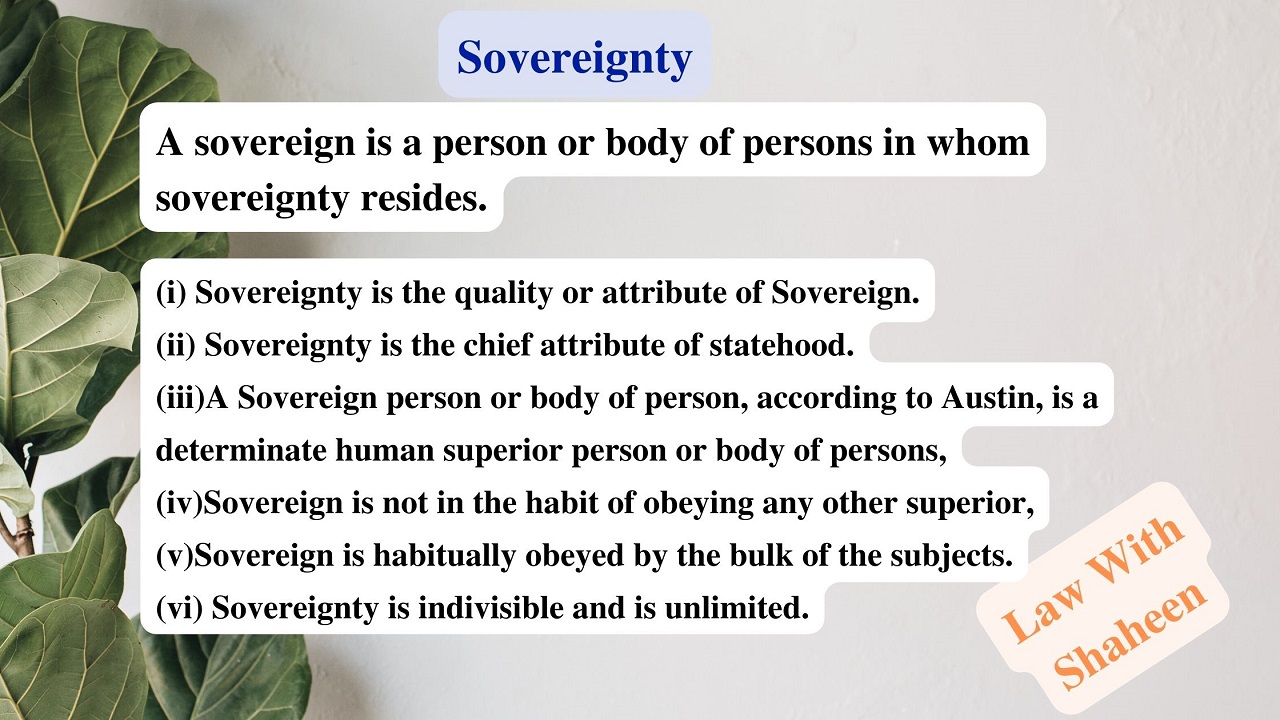Table of Contents
Introduction to Sovereignty:
The word ‘sovereign’ is commonly used in the sense of a king or monarch, possessing the highest unlimited powers in the state, but in jurisprudence, a sovereign is one who enforces the law.
Meaning of Sovereignty:
(i) In the Literal sense:
The term sovereignty means supreme dominion, authority, or rule.
(ii) In its popular sense:
The term sovereignty means supremacy or the right to demand obedience.
(iii) According to Black’s Law Dictionary:
The term sovereignty means the supreme political authority of an independent State.
Definition OF Sovereign:
(i) Bodin’s definition:
“The absolute and perpetual power within a state is sovereign.”
(ii)Hobber’s definition:
“A sovereign is a person or body of persons, who is not in habit of obeying any other superior or political superior and he commands habitual obedience from the bulk of his subjects”.
Sovereign State:
A state that possesses an independent existence, being complete in itself without being merely part of a large whole to whose government it is subject or a political community whose members are bound together by the tie of common subjection to some central authority, whose commands those members must obey, is a sovereign state.
In simple words, a sovereign state is one which is subordinate to no other. lt is supreme over the territory under its control. It issues orders that all men and all associations within its territory are bound to obey.
Characteristics of Sovereignty:
A sovereign is a person or body of persons in whom sovereignty resides.
(i) Sovereignty is the quality or attribute of Sovereign.
(ii) It is the chief attribute of statehood.
(iii)A Sovereign person or body of person, according to Austin, is a determinate human superior person or body of persons,
(iv) It is not in the habit of obeying any other superior,
(v)Sovereign is habitually obeyed by the bulk of the subjects.
(vi) Sovereignty is indivisible and is unlimited.
Attributes of Sovereign/Sovereignty:
The sovereign/Sovereignty has two ATTRIBUTES,
(i) Negative attribute:
The negative attribute is that it is not in the habit of obeying any other human superior.
(ii)positive attribute:
The positive attribute is that it is habitually Obeyed by the bulk of the subjects.
Kinds of Sovereign/Sovereignty:
Following are the kinds of sovereigns,
(i)Legal and political sovereigns,(according to Dicey),
(ii)De jure and De facto sovereigns,
(iii)internal and External sovereignty.
Legal and political sovereigns:
(i)Legal sovereign:
Sovereignty is legal where its law-making powers are unrestricted by any legal limit.
Example: parliament is the legal sovereign in England.
(ii)Political sovereign:
The political sovereign is one whose will is ultimately obeyed by the citizens of the State.
Example: The electors in a democratic State are a political sovereign because they can always. Ultimately enforce their will.
(ll) De jure and De facto sovereigns:
(i)De jure sovereign:
It is one who, though not actually exercising sovereign power, ought to be exercising these powers.
(ii)De facto sovereign:
It is one who is actually exercising sovereign powers and ought to be so exercising these powers.
(III) Internal and External Sovereignty:
(i) Internal Sovereignty:
This means paramountcy in all internal functions. : lt is the power of dealing on a nation’s behalf with other national governments.
(ii)External Sovereignty:
This means independence from all external and foreign control. It is the power that rules exercise over their own subjects. This respect of sovereignty qualifies a State for membership of the world body of nations.
To conclude a sovereign possesses an independent existence permanently occupying a fixed territory, being complete in itself. Simply a sovereign State is one which is subordinate to no other. It is supreme over the territory under its control.lt issues orders which all men and
all associations within its territory are bound to obey, is a sovereign State.
